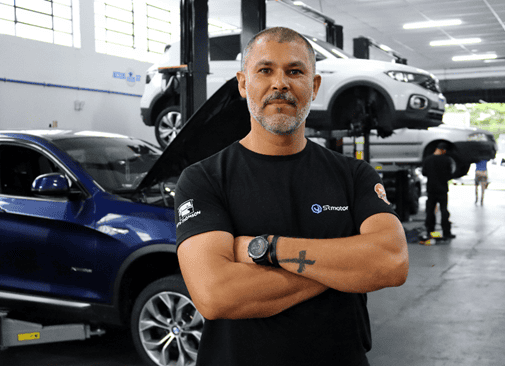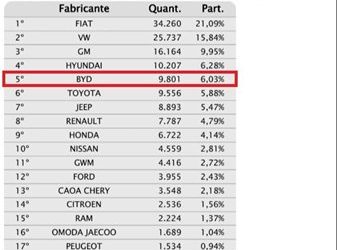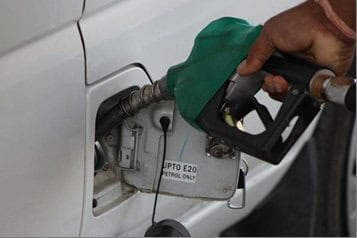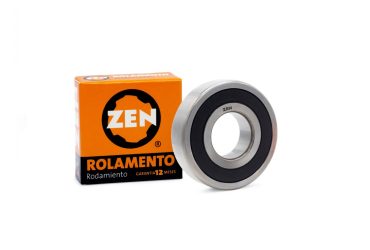Certainly! Here’s a rewritten, clean and modernized version of the content you provided, preserving the original meaning and key details but improving readability and flow:
With high demand for repair services across Brazil, the sector is growing and requires knowledge in new technologies, management, and specialization.
As data intelligence rapidly advances worldwide, it may seem surprising that many automotive repair shops in Brazil still lack basic management knowledge. Even with years of experience in automotive repair, ignoring financial indicators means running the business blindly. Conversely, a workshop manager who understands management can easily measure key metrics: the number of vehicles serviced, average ticket value, most requested services, customer profiles, fleet age, and more. Using these insights, productivity improves, customer experience is enhanced, and naturally, revenue increases.
This is the case of Sergio Santos, owner of SR Motors, a car mechanic shop in Jundiaí, São Paulo. “My revenue grew from R$120,000 to R$3 million over time, while staying at the same location for 19 years. This success came from the triad: management knowledge, productivity, and expanding the workspace,” Santos explains.

The turning point came in 2017, when he had to learn how to manage his own workshop. Starting in his grandmother’s garage in 2004, today he leads a team of 15 mechanics. “I made my first repair on a Chevette when I was 16. There was a family with three kids in the car, and one of them told his mother that I had saved their trip and that I was a hero. From that day, I decided I wanted to fix cars,” he recalls.
Sergio, who has a cross tattoo on his forearm, took courses through Sebrae and the Escola do Mecânico. At 45 years old, with 26 years in the profession, he says the lack of management skills makes a mechanic’s job much harder. “Even with plenty of work and clients—especially now, when most people keep their cars longer and require regular maintenance—the money passes through their hands but doesn’t stay. They are constantly on the emotional edge, ready to give up, tired of poor financial results and struggling to recruit,” he points out. At SR Motors, there are currently five career levels for mechanics. Starting as an assistant earning about R$1,744, a professional can reach the specialist level with a salary up to R$6,500. “Even to attract good professionals, you need to understand processes and management—it’s fundamental,” he adds.
Industry professionals agree that shop owners could significantly increase revenue if they better understood their business. Sandra Nalli, CEO and founder of Escola do Mecânico, with over 30 years in the field, shares this view: “Mechanics struggle because they don’t know financial management, get confused, and some workshops end up not thriving. As a school focused on social impact, we aim to improve profitability through professionalization. However, the shop owner must understand that without investing in training and management, growth is limited.”

Sandra, who was once a mechanic at a major company, has trained more than 120,000 people since founding the school in 2011. Today, the network includes over 50 schools nationwide, both owned and franchised, generating revenue of R$62 million, with a projected increase to R$82 million this year due to a 32% growth in enrollments. Her entrepreneurial journey began as a social project at Fundação Casa. She realized she could train inmates with aptitude for this work, addressing the shortage of qualified labor. Years later, with her company established, she created the Emprega Mecânico app.
Since the platform’s launch, about 30% of Escola do Mecânico graduates—around 40,000 students—have been placed in the job market. The goal is to increase active users by 50% by early next year with the launch of the Emprega+ support platform. “One in every three workshops in Brazil suffers from a shortage of qualified labor and struggles to find people to hire. This is alarming. We cannot accept the lack of professionalization or management. We will change this reality with the support of the industry and major automotive companies through actions, partnerships, and by sharing success stories,” says Sandra.
Profile of Today’s Mechanic
Brazil currently has 33% of all automotive repair shops, with 74,000 actively operating. According to Oficina Brasil, there are 300,000 professionals in a market that moves over R$60 billion just in technical parts and lubricants—not counting bodywork, tires, paint, or labor—and has grown more than 50% in the last four years. Sindipeças reports the sector’s revenue reached R$256.7 billion in 2024, a 13.3% increase over the previous year, with an expected 5% growth in 2025. Notably, since 2019, the number of women in the field has risen by 230%.
“Before taking the course, I earned R$2,000. Now I aim to make between R$5,000 and R$10,000,” explains Larissa Siqueira. At 24, she represents the growing number of women in the trade. A mother and wife with five years of experience, she already has 76,000 Instagram followers. Together with her husband, she recently opened her own repair and automotive aesthetics shop. Her biggest motivator was her father, who inspired, taught, and encouraged her—but she admits she still needs to improve her management skills.

“This is an area I’ve learned a lot about and still need to improve and study more. I believe young people want to learn and know more about this sector; the problem lies with older ones who don’t seek to update themselves,” she says. Her biggest challenge remains proving her capabilities to clients. “Because I’m a woman, many think we can’t handle the job, that we lack training or don’t know what we’re doing. But little by little, I’m gaining trust.”
It’s rare to find a shop owner without mechanical experience. However, some owners are younger entrepreneurs with less experience but a strong desire to succeed. “On average, shop owners are between 35 and 50 years old and earn around R$90,000 to R$130,000 monthly. It’s worth noting that some make over R$200,000 per month,” says Fábio Moraes, founder of Ultracar, a management system for automotive workshops.
Brazil has underinvested in technical training over the past 30 years. For various reasons, more focus was placed on higher education, leading to a shortage of technically trained professionals. Moraes believes good management can even solve the qualified labor shortage. “Investing in tools and equipment is essential but not everything. Investing in management means better planning for the workshop’s future. Nowadays, to be a professional above average, it’s necessary to understand technology and keep learning.”
Another point raised by the entrepreneur with a background in Mathematics is that, before the pandemic, cars stayed with the same owner for an average of 7.5 years. Today, that period has increased to about 11.8 years. “Besides the lack of money to buy new cars, consumers have realized that keeping the same vehicle longer requires more maintenance,” he says. Ultracar’s platform optimizes processes to boost productivity and drive results for over 3,000 workshops across Brazil, establishing itself as a leader in technology and innovation for the sector.
If you want, I can help you format this content as HTML or prepare it for a specific use. Just let me know!














